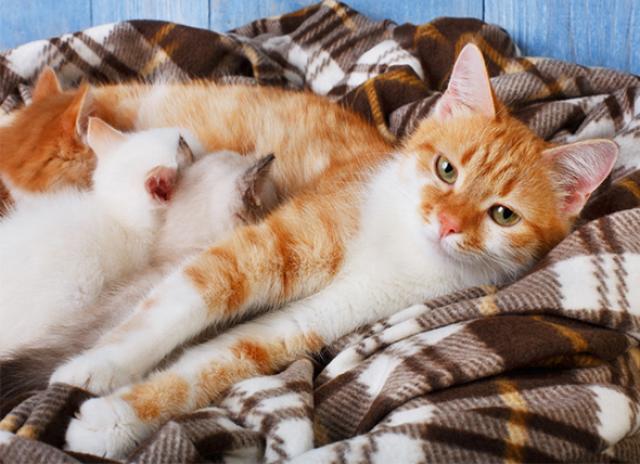Having kittens is an exciting and emotional time. Before you can experience the joy of welcoming newborn kittens into your home, you have to know how to tell if your cat is pregnant, how long a cat gestation period is and what you can do to ensure her pregnancy is as happy as possible.
It’s important to remember your cat and her litter will have needs they’ll depend on you to fulfill. To help support your cat throughout her pregnancy and labor, we’ve gathered some helpful information you should know about expectant cats.
Cat Pregnancy
Much like people, cats have periods of peak fertility when they are most likely to become pregnant, known as being “in season” or “in heat.” Cats can begin these cycles as early as four to five months of age and they occur about once every three weeks, giving her lots of opportunities to get pregnant.

If you’re looking to avoid an unexpected litter of kittens, you may want to speak to your veterinarian about neutering your cat when she’s young. By her first season, she will be fully capable of getting pregnant. Bringing up an unplanned litter of kittens can be stressful and expensive. This being the case, breeding kittens should be left to experts or individuals well prepared in advance for the task.
How Long Do Cats Stay Pregnant?
The typical cat gestation period can last 62 to 65 days. Your cat often won’t show any physical symptoms of pregnancy until she is a few weeks into her term. If you think your cat is pregnant, take her to the veterinarian for confirmation.
How to Tell if Your Cat is Pregnant
While you should always get a professional opinion, here are signs to look for if you suspect your cat may be pregnant:
- After approximately 15 to 18 days of cat pregnancies, you may notice that her nipples have become enlarged and red, commonly referred to as “pinking up.”
- Your cat may go through a stage of vomiting, similar to morning sickness in humans. If you notice her sickness becoming more frequent or she seems unwell in any other way, contact your veterinarian.
- Your cat’s belly will start to swell, but it’s essential to avoid touching it, so you don’t risk harming your cat or her unborn kittens. There can be other causes of abdominal swelling, so monitor your cat closely for any signs of illness and consult your veterinarian if you have any concerns.
- An expecting cat will gain between 1 to 2 kilograms (depending on the number of kittens she is carrying).
- Pregnant cats tend to have an increased appetite later in their pregnancy, which will also play a role in weight gain. An increased appetite could also be a sign of worms or illness, so double-check with your veterinarian to confirm.
- Your pregnant cat may act more maternal, meaning that she may purr more and seek extra attention from you.
- Some veterinary practices can diagnose cat pregnancy using ultrasound, sometimes as early as fifteen days into her term. Your vet may also be able to give you an indication of how many kittens your cat is expecting by day 40 of her pregnancy. Bear in mind that sometimes a larger kitten can obscure other smaller kittens in the womb, so don’t be surprised if you have more kittens than expected.
Although your cat should be more than capable of handling labor herself, make sure that you prepare as she approaches the end of her term. It’s good to be on standby to offer soothing words and step in to help if she runs into any complications.
Signs of Impending or Active Cat Labor
There are several signs to look out for that signal that the kittens are on their way. Here are some tips to keep in mind:
- If your cat refuses food, acts fidgety or looks for a secluded place to settle down, it could be because her labor is due to start very soon.
- Your cat’s body temperature will drop to around 100 Fahrenheit in the 12-24 hours before her labor starts.
- Right before giving birth, your cat may become vocal, appear agitated, and constantly groom herself.
- Delivery should start with strong abdominal contractions, followed by some discharge from her vagina. If the discharge is heavy and black or blood-colored, contact your veterinarian immediately.
- After the discharge, the kittens should follow immediately.
Most cat deliveries go smoothly without any need for your assistance. However, some signs, such as discolored discharge or the mother cat straining without producing kittens, could suggest complications. If you notice either of these or have any other concerns, contact your veterinarian.
